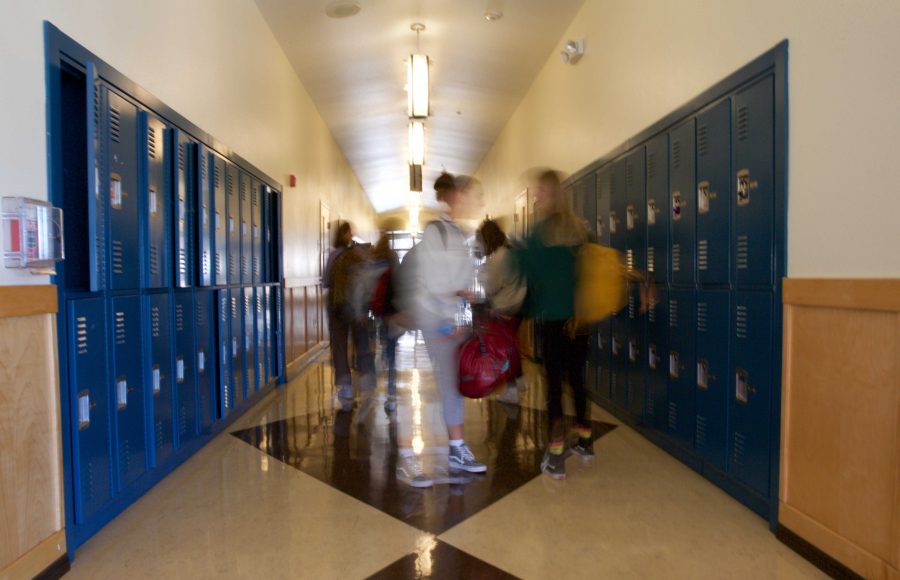Crackdown: Admin introduces new attendance policies
Dec 14, 2018
In an effort to reduce student tardiness and establish a punctual culture at Tam, the administration introduced two new tardy policies in the final months of the first semester.
The first initiative was announced on December 5 via the administrative newsletter. If a student is late to the same class three times in a week, or any assortment of classes five or more times in a week, that student will receive a 40-minute after-school detention with each repeated offense building towards more severe consequences.
The second new initiative involves a process known as tardy sweeps. These will be conducted as follows: on randomly selected days, teachers will be told to lock their classroom doors once class begins, preventing any late students from entering. Administrators will walk around campus, visiting each classroom to collect any students locked outside of their classes and proceed to hand out detentions. If a student receives three of these detentions, they will receive a social suspension, a ban from school-sanctioned activities for 30 days.
The first tardy sweep took place on November 14, and was announced beforehand; however, going forward sweeps will be conducted at random and with no warning.
“I wanted to establish a culture where we value instructional time and we create good habits by getting to class on time. In my two-plus years as principal I’ve observed that getting to class on time seems to be optional,” principal J.C. Farr said.
Farr explained that in order to get kids into class, they need to have a reason to be there as well as a desire to be there.
“There has to be a balance between consequence and giving you a reason to care and want to come on time,” Farr said.
Recognizing that there are many reasons as to why a student could be late to class, Farr said, “There is a conversation that happens when any type of sweep occurs. There’s always valid reasons whether it’s beyond their control, and I think that this doesn’t target those students, it targets the habitual, it’s the pattern that we are looking to address.”
Prior to making any sweeping decisions, Farr collected data and spoke to students he thought were at risk of being negatively affected by the sweeps.
“One of the first things I did before even thinking about this was to pull some data to see how many students are coming late and showing patterns. I’ve pulled data for a couple weeks,” Farr said. The administration plans to track students who fall into the category of chronic absenteeism as well as find out what is causing these students to miss so much school.
“Any time you have a situation where you have students that are chronically absent or tardy, you have to unpack and get to the root causes of it,” Farr said. “Is there a transportation issue? A motivation issue? Is there a grades issue?”

Tardy sweeps will not take place during the first period of a day, according to Farr, because factors outside students’ control, like public transportation, can prevent them from getting to school on time.
Tardy sweeps now are at the center of a debate between teachers, students, and administrators. Social studies teacher Matthew Tierney has exercised his own means of enforcing attendance by locking the classroom door, and then proceeding to mark students tardy as he lets the late ones in one by one.
But Tierney has used this system since before the new policies were introduced. He said, “What was happening was the tardies were getting out of control, and I got fed up so I started to shut the door when the bell rang.”
Tierney isn’t the only teacher who has taken matters into his own hands. Science teacher David Lapp has been locking students out of class since, in his words, “the last century.”
“When the bell rings, they’re not allowed to come through the front door. If it’s three seconds after the bell and somebody walks in, I say wrong door,” Lapp said. “Because I start class immediately, if somebody walks in a few seconds late it’s distracting. Students quickly find out that if they’re tardy, they’re gonna sit out there.”
Lapp believes there are better solutions to preventing tardiness than the new sweep policy. “I mean, why do [ sweeps] when I can just click tardy and then electronically it sends a message to admin? They don’t have to physically round people up,” he said. Lapp talked about what policies he believed would work, and brought up his time teaching in a suburb of Chicago.
“You would see kids sprinting to get to class. There was a tardy policy. If you got your third tardy, you’d get a detention, and every tardy after that would be another after-school detention for an hour, silent, and kids just hated it,” Lapp said. “This is not rocket science.”
Lapp said his means of ensuring punctuality have proven successful. “The number of tardies that I give in a day is usually zero,” he said. “Kids know there’s no leeway. And I’ve been doing it because the school doesn’t have a tardy policy.”
Some students have expressed concern about the sweeps. Sophomore Derrick Moore is concerned that the new policy will backfire on the administration.
“I feel like that’ll make kids be even more late to class. If they’re collecting you, and making you stay longer, you’re gonna be even more tardy,” Moore said. “We come here to learn, but with this, we’re learning less.”
Farr stressed that tardies will not stop seniors from walking at graduation. “Graduation is not about attendance, it’s about passing classes, [so] I’m more likely to be flexible,” he said. “If you pass your classes then you’ll participate in graduation, but prom is a privilege reserved for those who have followed [the rules] and have been a senior in good standing.”
Photos by Ethan Swope.




